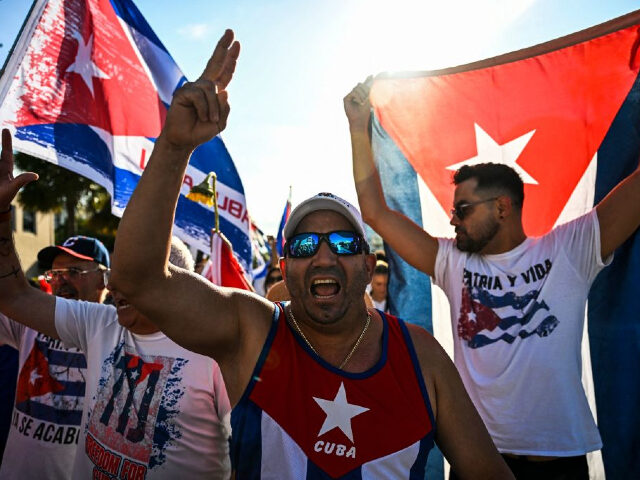Cubans carried out 361 protests against the communist Castro regime and its puppet-president Miguel Díaz-Canel in August, according to statistical information published by the Cuban Observatory of Conflict on Thursday.
With an average 11 protests per day, August 2022 had the most registered protests in Cuba since the July 2021 protests.
The Observatory, a civil society organization, documented 2,074 protests against the communist regime during the first eight months of 2022. The Observatory’s data also show that Cubans’ protests consistently grew in size and number between January and June 2020, which exponentially exploded into the historical nationwide wave of protests of July 2021, when over 187,000 Cubans participated in at least 584 protests nationwide.
While historically significant, the July 2021 protests were not the first major event against the Castro regime. Cuban dissidents have protested in large numbers against the Castro regime – which was installed in the 1959 coup and never received an electoral mandate – for decades. In 1994, for example, a protest now known as the Maleconazo attracted thousands of unarmed Cubans demanding freedom and protesting against communist dictator Fidel Castro. The island nation’s communist regime retaliated by arresting, beating, and shooting protesters.
Another significant crackdown on dissidence took place in 2003 during the events known as the Black Spring, when the Castro regime, in an effort to curb growing dissent, arrested journalists and human rights activists, sentencing them to nearly three decades in prison. The events of the Black Spring gave forth to the founding of the group known as the Ladies in White (Damas de Blanco), an organization composed by the mothers, sisters, daughters, and wives of political prisoners in Cuba.
The situation in Cuba has continued to worsen since July 2021. The Observatory stated that the factors that contributed to a growth in August’s protests were the worsening situation of Cuba’s failing power grid and rolling blackouts, inflation, which the Castro regime claims reached 13.40 percent during the first semester of 2022, the ongoing severe food shortages, and the collapse of Cuba’s already precarious health system as a result of the ongoing dengue epidemic in the island.
The Observatory’s data show that even the most peaceful forms of protests have more than doubled. The amount of cacerolazos — a form of protest where a group of people bang empty pots and pans to make noise — went from 20 registered during July to 49 in August, a significant 149-percent increase.
Just as the protests increased during August, so did the Castro regime’s brutal repression.
On August 1, family members of citizens arrested during the July 2021 protests were arrested for protesting outside the Havana Cathedral and demanding freedom for their relatives. A two-day series of protests against the communist regime and the inhumanly long rolling blackouts in eastern Nuevitas, Camagüey, resulted in a series of arrests and fierce police brutality, where three preteen girls were assaulted by the Castro regime’s police. The mothers of two of the three assaulted girls were arrested days later.
The Castro regime has also begun to fiercely punish some of the men and women arrested during the July 2021 protests for their refusal to become loyal to communism as part of what the regime calls “ideological rehabilitation.”
The Cuban Observatory of Conflict ended its September 1 report by stating that despite the growing protests related to economic and societal factors, the main driving force of resistance to the regime continues to be the demand for freedom and an end to communism, which has reigned over the island for 63 years.
“Notably, demonstrations directly accusing the government of mismanagement doubled, from 85 in July to 172 last month. But not only does the quantitative increase stand out: although many of the protests demanded a change in the Díaz-Canel government, they have also demanded a change in the system: no more socialism,” the report concluded.
Christian K. Caruzo is a Venezuelan writer and documents life under socialism. You can follow him on Twitter here.

COMMENTS
Please let us know if you're having issues with commenting.